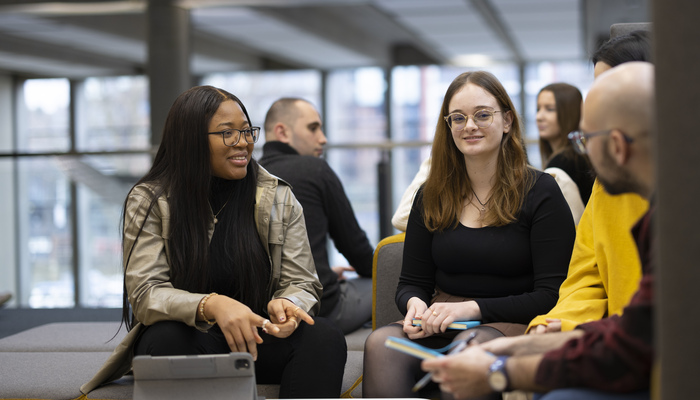Hear from Our Consultants and Mentors
Find out more about the experiences of our Student Consultants and Staff Mentors, including what they learned from their experiences while collaborating on the project.
Staff and Student Testimonials
/prod01/university-of-lincoln-cdn-pxl/media/responsive2017/UofL,May23,148,by,Electric,Egg,eggr7866.jpg )
The Student Futures Manifesto aims to create a set of actions and commitments to enhance the student experience at the University of Lincoln. The project has built upon the work of the UPP Student Futures Commission, which identified a baseline of students who had low confidence, who were potentially behind in academic progress, and had increased anxiety and a loss of social skills following the Covid-19 pandemic. The Commission wanted to increase support for students, to help prepare them for successful careers.
The Commission argued for a move towards knowledge economy values being central in institutions, with environments that are built in partnership with students. This practice emphasises the move towards physical and digital spaces, an environment that promotes learning over teaching, and fosters a model of co-creation, creating community, rather than surface level engagement. The project outlined six key themes in which to strive for development. The Student Futures Manifesto is guided by these themes to best support students and develop provision for the future. The Manifesto aims to commit to the actions outlined in the final report and develop a communications strategy to champion the work done. The University of Lincoln aims to deliver on these commitments within five years.
In February 2022 the UPP Foundation Student Futures Commission launched the New Student Futures Manifesto (SFM). This manifesto aims to connect universities and the Student Futures Commission as joint partners in developing support offered to their students, to build students' sense of belonging following the Covid-19 pandemic.
Based upon six key themes, the manifesto is a commitment to enhance and create a series of support mechanisms with the aim of making positive contributions to the student experience. The manifesto commitment is student led and ‘owned’, from start to finish, and is firmly established as a collaborative process, supplementing the University's partnership approaches with student engagement.
Six student consultants were recruited to champion and lead the Student Futures Manifesto project at the University of Lincoln. The role of each student was to act as a consultant to develop a student manifesto that commits to improvements in the six overarching themes, with the aim of improving the academic, social, and progression opportunities within the University of Lincoln. Each student interviewed for their specialised theme and showed a passion for bringing improvements to student life, confidence, academic progress, and their social skills.
Each of our student consultants, paired with an academic member of staff in their field, developed key questions to target their insight into their theme which created the Student Futures Survey. The survey collected data, gathered from the student population, and informed focus groups which could then further explore the themes and target areas for development to support the project's aims.
A Student Futures Manifesto oversight group was also set up to guide and oversee the student consultants. This group included the Dean of the Lincoln Academy of Learning and Teaching (LALT), with representation from the Students' Union, student consultants, and staff mentors.
Working with my student consultant gave me greater insight into the student experience and allowed me to see and appreciate how a student views the way in which we promote support services across the University.
Jacqueline Drury
Student Mentor and Director of Student Services
Our student consultants have provided a range of recommendations for each of the themes identified by the work of the UPP Foundation. These recommendations were informed by the data collected during the project, and provide guidance on where our student population want the University to commit to targeted development. These developments should empower the values of community, ensure digital learning enables wellbeing and social development, and embody the knowledge economy. For each of the overarching themes, the commitments and actions are proposed.

You can now download and read the full report on the final recommendation of the project. The next steps are for task and finish groups to be created to progress with actions and operationalise the findings of the project.
To create a series of microcredential programmes to allow prospective and incoming students to build up their understanding of the expected knowledge, identify gaps in this knowledge, and potentially allow academic staff to establish a baseline of academic knowledge of a cohort.
To provide a pair of centralised ‘hubs’ to prepare for commencing university study. These hubs would be prominent on the University's website with links to student life, course pages, students’ union, online prospectus, and official University social media accounts.
To provide further information, in the form of a booklet for each course/School containing further information regarding course structure, nature of study, and assessments. These would ideally be a physical document with an online version available.
Provide an opportunity within Welcome Week for students to meet and informally chat with students about their own experiences so that students have another way to ask questions.
Ensure that resources provided during Welcome Week are accessible all year round, so students are able to appropriately access the resource they need easily.
Students should complete a project within their first week in the form of a scavenger hunt, which would help them orientate themselves around the University and provide them with necessary knowledge about what support is available.
To reinstate self-certification for extensions in the 2023/24 academic year. This would support students in need of additional time due to mental health conditions and concerns.
Channels of communication need to be developed when advertising services or supporting students who have reached out for help. Students need to be made more aware of the services available to them as they start their university experience in their first year of study.
All new students during Welcome Week need to be made aware of the support offered by the Wellbeing Centre and how to contact them.
The flipped classroom is an instructional approach that typically involves students engaging with pre-recorded lectures or materials before the class session, allowing for more interactive and collaborative activities during in-person class time. It encourages active learning, student engagement, and peer-to-peer interaction. It is also key to ensure students are well-informed about the available teaching methods and their benefits, and it is recommended to improve communication and resources regarding teaching approaches.
Enhance information provision to improve the clarity and depth of information provided to prospective students during the decision-making process, particularly regarding teaching methods, expectations, and make the learning curve a bit easier.
To address the desire for more practical sessions, The University of Lincoln should focus on integrating hands-on experiences and real-world applications into learning experience. This can include incorporating case studies, simulations, or collaborative projects.
This has been a key area that was highlighted in the focus group, and evident with the low number of responses to the survey. There is uncertainty as to why student engagement and participation is low when opportunities are given. Suggested solutions could be through the use of incentives to encourage participation.
Student-led groups within the curriculum to enable collaboration between staff and students and truly ensure learning has a student-focused approach, supporting students to achieve the best outcomes.
Based on the survey results and comments made in the focus group, students are either not aware of opportunities or feel as though they are unable to participate. A recommendation to provide more exposure of these within the curriculum is to have College-specific announcements released monthly, so that
students are aware of what is available.
Training opportunities to be offered to students alongside their degree to support them in their future careers. This could include academic skill support such AWS training for business students, Excel, and Word certificates. Non-academic skills could include first aid training, British Sign Language, formal writing, or team-working and confidence building courses.
To integrate careers and employability further into teaching with courses and modules to take career readiness seriously and better prepare their students for the future.
Ensure that students know what activities and services are offered and how they can get access to them. This could include featuring these events within student timetables.
The Manifesto aims to commit to the actions outlined in the final report and develop a communications strategy to champion the work done. The University of Lincoln aims to deliver on these commitments within five years.
Find out more about the experiences of our Student Consultants and Staff Mentors, including what they learned from their experiences while collaborating on the project.
Staff and Student Testimonials